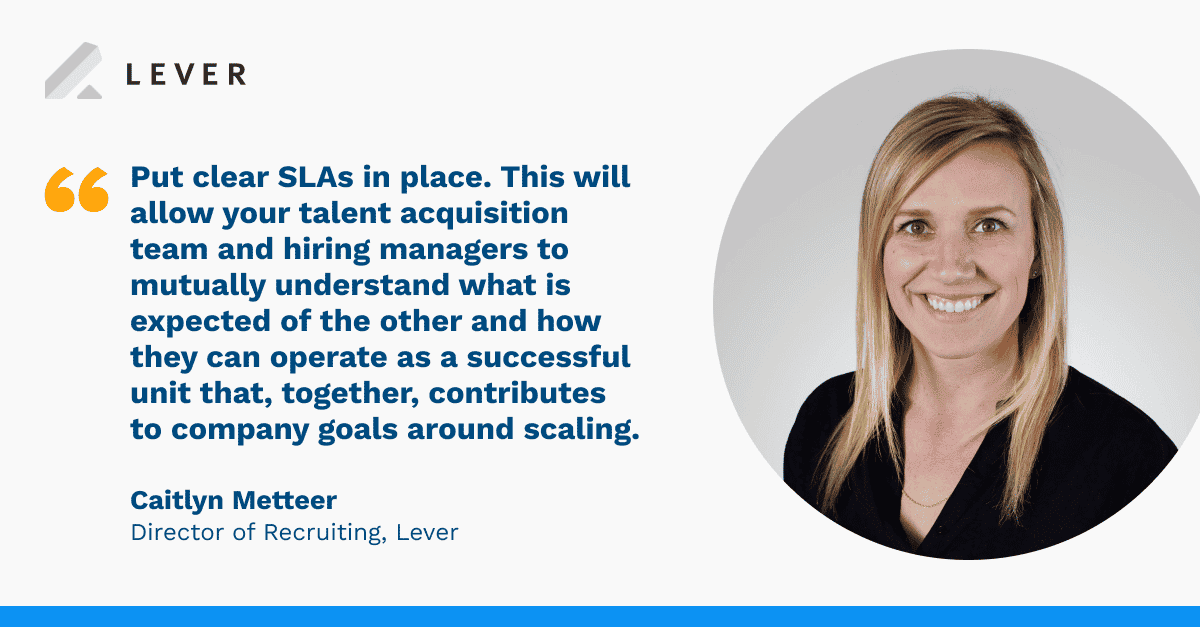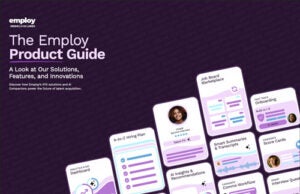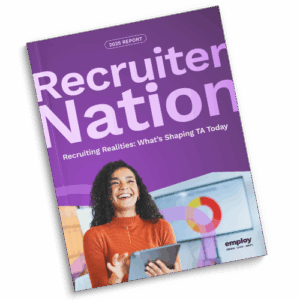If you’re a recruiter, chances are you’ve brought your hiring managers some pretty terrible candidate fits at one point or another. Knowing how deeply they care about building the right team, your ultimate goal is to help them find the best people.
- Needless to say, it’s beyond devastating when the two of you don’t see eye to eye.
So, how do you develop and nurture a partnership with your hiring manager — a relationship in which you’re always on the same page? The answer: constant communication.
It sounds simple. But there are a few discussions we think you absolutely must have with one another in order to be a successful, synchronized hiring duo that helps onboard top talent.
7 conversations recruiters must have with hiring managers to achieve shared growth goals
Here are seven conversations you can (and should) initiate with hiring managers today.
1) Walk your hiring manager through your typical recruitment process.
Before you begin to co-manage a new process, schedule a kick-off call with hiring managers.
You’ll cover a myriad of topics in this first check-in, but the most essential one to discuss is obvious: how and where you recruit (i.e., source new candidates).
Whether your hiring manager is new to hiring in general or new to hiring with you, they’ll seek a clear understanding of how you structure your recruitment process.
Do you typically conduct the phone interview or does the hiring manager? How do you define a skills fit? Do you think of it as a way to gauge candidate motivations or their communication skills? This kind of insight is gold for your hiring manager.
2) Gauge their ability to devote serious time to hiring.
Once you give your hiring manager a clear lens into your recruiting tactics and techniques, get an idea of what their schedule will look like in the coming months.
Some managers will have more time to devote to hiring than others. Does yours have a huge product to launch or a project to finish before a looming deadline?
Ideally, your hiring manager plans to devote a substantial amount of time and energy to finding the right candidate. One key to scaling quickly is encouraging executives to spend a high percentage of their time on hiring.

3) Learn about your hiring manager’s expectations for candidates
To do your job as well as possible, you need a full picture of your candidate’s day-to-day responsibilities. No one is going to know them better than their future manager.
Qualifications like “proficiency in Adobe Photoshop” and “5 years of management experience” may be important to know about, but it’s more important to learn what specific tasks candidates will need to perform in their everyday role.
- In order to write your impact job descriptions and help your candidates visualize their future work day, you need to know what goals they should be ready to hit when they’re three months, six months, and one year into their role.
A foolproof way to learn what expectations your hiring manager has for candidates? Walk through several resumes with them in person. More specifically, sit down with them and dig into what they do and don’t like about each resume.
4) Figure out what makes top performers in your organization successful.
Another way to effectively grasp your hiring manager’s ideal candidate? Ask for a list of top performers already on their team to determine what traits they prefer in employees.
Again, it’s key to dig into why they value these employees’ contributions. Once you figure out which strategies, attitude, and processes make those team members successful, you can look for those same qualities in your candidates.
Take copious notes on the employees your hiring manager describes, then set up 1:1s with those very employees. Inevitably, they will view their own working style and corresponding success slightly differently from your hiring manager.
That added perspective will equip you further as you continue your candidate search.
5) Check in regularly to see how their hiring needs are evolving.
As you continue recruiting for your hiring manager’s team, their goals will likely shift. To make sure you stay on the same page, schedule bi-weekly check-ins. During these meetings, you’ll want to discuss the state of their current team.
Ask questions around their current pain points, if they’re accomplishing the goals they want with their team, and how they think their needs will change in the coming months.
6) Encourage your hiring manager to attend recruiting events with you .
Opportunities to meet candidates aren’t limited to just recruiters. Encourage your hiring manager to join you at various meetups, conferences, and other networking events.
- As you partner with your hiring manager, remind them candidates want to hear their perspective just as much as they want to hear yours. (And they’d love to hear it in person.)
Candidates are constantly bombarded by new job opportunities online. An in-person interaction is much more meaningful than the most personalized LinkedIn InMail.
Once you’ve brought your hiring manager to a few meetups, plan a recruiting event with them.
7) Set aside time for two-way feedback.
In the end, a great way to maintain a successful partnership with your hiring manager is to establish a regular, consistent pattern of two-way feedback. After each interview process, reflect upon what went well with your last candidate and what didn’t.
If you wish their team had submitted feedback quicker so you could’ve updated the candidate sooner, don’t be afraid to say so. If you both didn’t realize a candidate wasn’t a fit until the end of the process, ask what you could have done differently to realize that sooner.
Download our Full-Cycle Recruiting Playbook to learn how talent leaders can work with their recruiters and hiring managers to develop a proactive talent acquisition strategy.
















